Borrelia burgdorferi and Lyme Disease Pathogenesis: Difference between revisions
From MicrobeWiki, the student-edited microbiology resource
No edit summary |
No edit summary |
||
| Line 1: | Line 1: | ||
<!-- Do not edit this line-->{{Slonczewski}} | <!-- Do not edit this line-->{{Slonczewski}} | ||
==Section== | ==Section== | ||
[[Image:Borrelia_Pic.jpeg|thumb|300px|right|A scanning electron micrograph of a cluster Borrelia burgdorferi bacteria. Micrograph taken by Claudia Molins at the CDC in 2011. [http://phil.cdc.gov/phil/details.asp?pid=13176}.]] | [[Image:Borrelia_Pic.jpeg|thumb|300px|right|Figure 1. A scanning electron micrograph of a cluster Borrelia burgdorferi bacteria. Micrograph taken by Claudia Molins at the CDC in 2011. [http://phil.cdc.gov/phil/details.asp?pid=13176}.]] | ||
[[Image:Spirochete_Morphology.jpeg|thumb|300px|right| Diagram of spirochete showing the flagella and the flagellar motor in between the outer and inner membrane. [http://www.sciencedirect.com/science/article/pii/S1369527415001368]] | [[Image:Spirochete_Morphology.jpeg|thumb|300px|right| Figure 2. Diagram of spirochete showing the flagella and the flagellar motor in between the outer and inner membrane. [http://www.sciencedirect.com/science/article/pii/S1369527415001368]] | ||
[[Image:Lyme Cycle.jpeg|thumb|300px|right| Figure 3. Diagram of B. burgendorferi life cycle and transmission from tick host to other organisms. [http://www.nature.com/nrmicro/journal/v10/n2/fig_tab/nrmicro2714_F1.html]] | |||
[[Image:Erythema_migrans.jpeg|thumb|300px|right| Figure 4. Photo of erythema migrans rash following a tick bite. [http://www.cdc.gov/lyme/signs_symptoms/rashes.html]] | |||
[[Image:SodA_expression.gif|thumb|600px|right| Figure 5. Results of experiments by Troxell et al. showing the expression level of the protein SodA when exposed to different metal compounds. [http://www.jbc.org/content/287/23/19284.long]] | |||
[[Image:Scalp15_expression.jpeg|thumb|600px|right| Figure 6. Results showing the expression of Scalp15 in uninfected and infected ticks. [http://www.nature.com/nature/journal/v436/n7050/fig_tab/nature03812_F1.html]] | |||
[[Image:Borrelia_Interactions.png|thumb|800px|right| Figure 7. The observed interactions between B. burgendorferi and the vasculature in mice. [http://journals.plos.org/plospathogens/article?id=10.1371%2Fjournal.ppat.1000090]] | |||
Research Question: Why is the bacterium so good at evading the host's immune response? <ref>[http://www.jbc.org/content/early/2012/04/12/jbc.M112.344903.full.pdf+htm]=Troxell, Bryan, Haijun Xu, and Frank Yang. "Borrelia Burgdorferi, a Pathogen That Lacks Iron, Encodes a Manganese-dependent Superoxide Dismutase Essential for Resistance to Streptonigrin." Borrelia Burgdorferi, a Pathogen That Lacks Iron, Encodes a Manganese-dependent Superoxide Dismutase Essential for Resistance to Streptonigrin. Journal of Biological Chemistry, 12 Apr. 2012. Web. 17 Apr. 2016. </ref> | Research Question: Why is the bacterium so good at evading the host's immune response? <ref>[http://www.jbc.org/content/early/2012/04/12/jbc.M112.344903.full.pdf+htm]=Troxell, Bryan, Haijun Xu, and Frank Yang. "Borrelia Burgdorferi, a Pathogen That Lacks Iron, Encodes a Manganese-dependent Superoxide Dismutase Essential for Resistance to Streptonigrin." Borrelia Burgdorferi, a Pathogen That Lacks Iron, Encodes a Manganese-dependent Superoxide Dismutase Essential for Resistance to Streptonigrin. Journal of Biological Chemistry, 12 Apr. 2012. Web. 17 Apr. 2016. </ref> | ||
Revision as of 14:07, 26 April 2016
Section
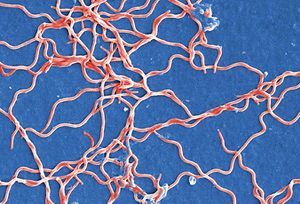
Figure 1. A scanning electron micrograph of a cluster Borrelia burgdorferi bacteria. Micrograph taken by Claudia Molins at the CDC in 2011. [http://phil.cdc.gov/phil/details.asp?pid=13176}.
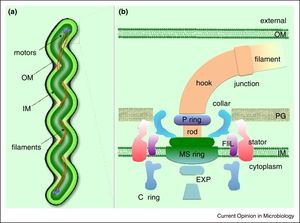
Figure 2. Diagram of spirochete showing the flagella and the flagellar motor in between the outer and inner membrane. [http://www.sciencedirect.com/science/article/pii/S1369527415001368
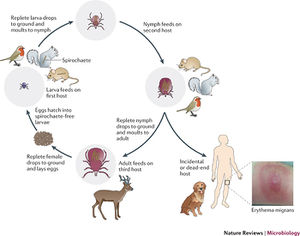
Figure 3. Diagram of B. burgendorferi life cycle and transmission from tick host to other organisms. [http://www.nature.com/nrmicro/journal/v10/n2/fig_tab/nrmicro2714_F1.html
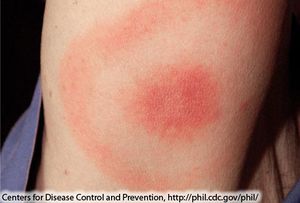
Figure 4. Photo of erythema migrans rash following a tick bite. [http://www.cdc.gov/lyme/signs_symptoms/rashes.html
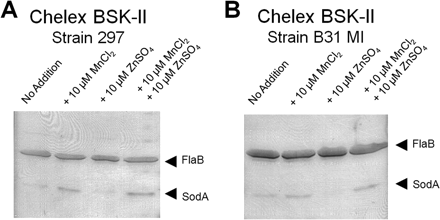
Figure 5. Results of experiments by Troxell et al. showing the expression level of the protein SodA when exposed to different metal compounds. [http://www.jbc.org/content/287/23/19284.long

Figure 6. Results showing the expression of Scalp15 in uninfected and infected ticks. [http://www.nature.com/nature/journal/v436/n7050/fig_tab/nature03812_F1.html

Figure 7. The observed interactions between B. burgendorferi and the vasculature in mice. [http://journals.plos.org/plospathogens/article?id=10.1371%2Fjournal.ppat.1000090
Research Question: Why is the bacterium so good at evading the host's immune response? [1]
Section 1
Section 2
Section 3
Section 4
Conclusion
References
- ↑ [1]=Troxell, Bryan, Haijun Xu, and Frank Yang. "Borrelia Burgdorferi, a Pathogen That Lacks Iron, Encodes a Manganese-dependent Superoxide Dismutase Essential for Resistance to Streptonigrin." Borrelia Burgdorferi, a Pathogen That Lacks Iron, Encodes a Manganese-dependent Superoxide Dismutase Essential for Resistance to Streptonigrin. Journal of Biological Chemistry, 12 Apr. 2012. Web. 17 Apr. 2016.
Authored for BIOL 238 Microbiology, taught by Joan Slonczewski, 2016, Kenyon College.
